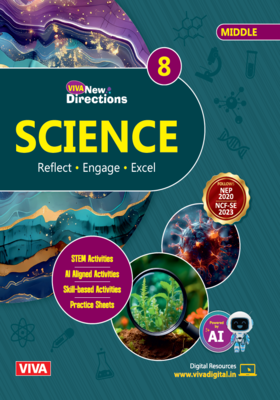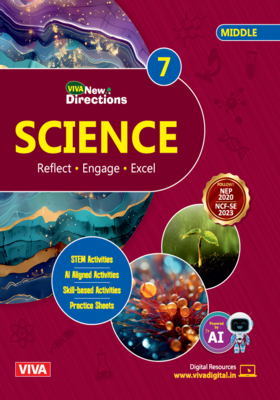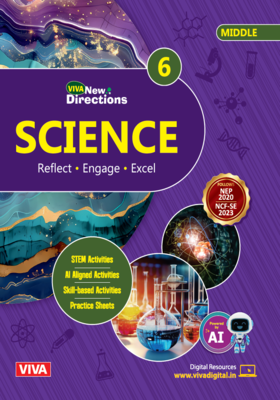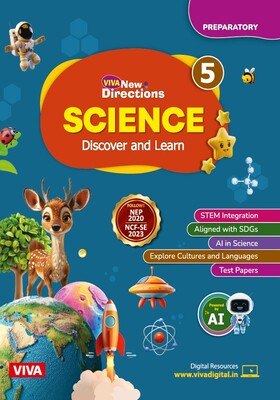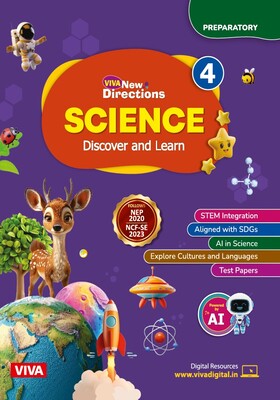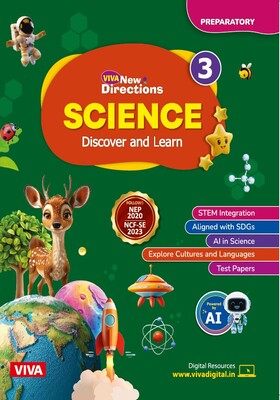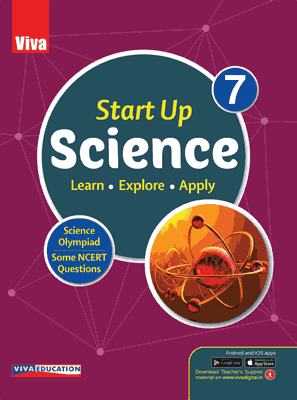
Viva Start Up Science, 7
Viva Start Up Science, 7
Learn • Explore • Apply (Science Olympiad, Selected NCERT Questions)
₹695.00
Go to cartISBN: 9789388386067
Bind: Paperback
Year: 2020
Pages: 316
Size: 8.5 x 11 Inch
Publisher: Viva Education
Exclusive Distributors: Viva Books
Sales Territory: Worldwide
Start Up Science for classes 6 to 8 exposes children to the vibrant nature and to the physical and chemical principles underlying various natural phenomena. The series is based on the principles of child-centered education, activity-based learning and holistic child development. It presents the subject matter in a carefully structured manner keeping in mind the vision of the National Curriculum Framework.
Key Features of Start Up Science 6 to 8
- Simple, easy to understand language and appropriately graded
- Margmments consisting of word meanings, Key Facts, Do You Know, Mind Scramblers and Classroom Discussions (containing questions based on Thinking Skills)
- In-text questions in Answer Orally
- A wide variety of exercises to assess the concepts learnt
- Ample number of tasks including activities and projects
- Sample test papers given to assess the knowledge of students
- Practice questions for Science Olympiad
Online Support Material:
- Printable Worksheets for Each Chapter
- Printable Practice Test Papers
- Answer Key
Online Support: www.vivadigital.in
Download Teacher's Support material on www.vivadigital.in
Download the Start Up Science app to enjoy the wholesome interactive learning experience.
Also Available:
- Interactive Learning App
- Start Up Science Workbooks
- Detailed Teacher's Resource Material
- Start Up Science Lab Manuals
Target Audience:
Students of CBSE Class 7.
Contents:
Chapter 1: Nutrition in Plants • Nutrition • Modes of Nutrition • Nutrition in Plants•••Photosynthesis • Heterotrophic Nutrition in Plants
Chapter 2: Nutrition in Animals • Steps in Animal Nutrition • Nutrition in Amoeba • Nutrition in Humans • Nutrition in Grass-Eating Animals
Chapter 3: Materials of Daily Use • Wool • Silk
Chapter 4: Heat • Heat: A Form of Energy • Measurement of Temperature • Thermometer•••Measuring Temperature • Clinical Thermometer • Laboratory Thermometer • Transfer of Heat • Modes of Transfer of Heat • Thermos Flask
Practice Paper (Based on Chapters 1 to 4)
Chapter 5: Different Kinds of Materials • Acidic Substances or Acids • Basic Substances or Bases • Indicators • Neutralization Reaction • Uses of Neutralization Reaction in Everyday Life
Chapter 6: How Things React with One Another • Physical Change • Chemical Change • Rusting of Iron • Crystallization
Chapter 7: Weather, Climate and Adaptations of Animals • Weather • Weather Conditions • Climate • Adaptations of Animals to Climate
Chapter 8: Soil • Soil and Its Importance • Formation of Soil • Soil Profile • Composition of Soil • Properties of Soil • Soil and Crops • Soil Erosion
Chapter 9: Respiration in Organisms • Why do Living Organisms Respire• • Types of Respiration • Process of Respiration • Breathing • Human Respiratory System • Mechanism of Breathing in Humans • Breathing in other Animals • Respiration in Plants
Practice Paper (Based on Chapters 5 to 9)
Test Yourself (Based on Chapters 1 to 9)
Chapter 10: Transportation of Materials • Circulatory System • Excretion • Transport of Substances in Plants
Chapter 11: Reproduction in Plants • Modes of Reproduction • Asexual Reproduction • Sexual Reproduction • Sexual Reproduction in Plants • Dispersal of fruit and seeds
Chapter 12: Motion and Time • Slow and Fast Motion • Measurement of Time • Units of Time • Speed • Measurement of Speed
Chapter 13: Electric Current and Its Effects • Electric Circuit • Electrical Components and their Symbols • Resistance, Conductors and Insulators • Heating Effect of Electric Current • Magnetic Effects of Electric Current
Practice Paper (Based on Chapters 10 to 13)
Chapter 14: Light • Light Travels in a Straight Line • Reflection of Light • Formation of Images in Spherical Mirrors • Formation of Images in Lenses • White light Consists of Seven Colours
Chapter 15: Winds, Storms and Cyclones • Air Exerts Pressure • Air Pressure Reduces When Wind Speed Increases • Air Expands on Heating • Generation of Wind • Types of Storms • Destruction Caused by Cyclones • Safety Measures • Weather Instruments
Chapter 16: Scarcity of Water • States of Water • Availability of Water • Scarcity of Water • Effect of Water Scarcity on Plants • Depletion of Water Table • Water Management
Chapter 17: Forests • Description of a Forest • Uses of Forests • Interdependence of Plants and Animals • Destruction of Forests • Conservation of Forests
Chapter 18: Waste Management • Sewage • Wastewater Treatment • Wastewater Treatment Plant (WWTP) • Better Housekeeping Practices • Sanitation and Sewage Disposal
Practice Paper (Based on Chapters 14 to 18)
Test Yourself (Based on Chapters 10 to 18)
Practice Questions for Science Olympiad
Glossary
About the Authors:
Neha Sharma is a gold medalist in M.Tech. from Guru Gobind Singh lndraprastha University. She did her M.Sc. in Physics from University of Delhi and has worked as an Assistant Professor in Galgotias College of Engineering and Technology, Greater Noida for more than seven years. Presently she is working as PGT Physics in Venkateshwar Global School, Rohini.
Akanksha Dudpuri (M.Tech. in Biotechnology) is an educational books editor and a resource person based in New Delhi.
About the Series Editor:
Ajoy Ghatak has served as a Professor of Physics in IIT Delhi. He obtained his M.Sc. from the University of Delhi and Ph.D. from Cornell University. The awards he has received include the 2008 SPlE Educator Award, the 2003 Optical Society of America Esther Hoffman Beller Award, the CSlR S.S. Bhatnagar Award, the 16th Khwarizmi International Award, the International Commission for Optics Galileo Galilei Award and the Meghnad Saha Award for outstanding research contributions in theoretical sciences. He received a D.Sc. (Honoris Causa) from the University of Burdwan in 2007. Professor Ghatak has published numerous books in the areas of Optics, Quantum Mechanics and Fiber Optics and is a tireless promoter of science education worldwide.
